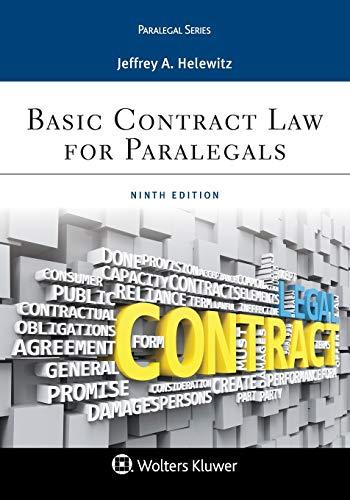Rheem Manufacturing Company, American Water Heater Company, the Bradford White Corporation, A.O. Smith Corporation, State Industries, Inc.,
Question:
Rheem Manufacturing Company, American Water Heater Company, the Bradford White Corporation, A.O. Smith Corporation, State Industries, Inc., and Lochinvar Corporation (collectively, the “manufacturers”) are manufacturers of water heaters. Delta Mechanical, Inc. (“Delta”) is a plumbing company. This appeal arises out of a class action settlement between the manufacturers and the owners of defective water heaters that had been produced by the manufacturers. The settlement agreement required the manufacturers to pay authorized third-party contractors to replace or repair the defective water heaters. Delta served as one of the authorized third-party contractors. The settlement agreement set forth the claims protocol that class members were required to follow in order to obtain the replacement or repair.
While Delta received over $3,000,000 from the manufacturers for providing nearly 24,000 repairs or replacements, the manufacturers refused to reimburse Delta for approximately $500,000 because Delta’s customers failed to follow the claims protocol in certain instances. Delta then filed the present action against the manufacturers. The district court granted summary judgment in favor of the manufacturers on the ground that Delta was not a third-party beneficiary of the settlement agreement under Missouri law because “any obligation assumed by [the manufacturers] was indirect and conditional.” Delta Mech., Inc. v. Garden City Grp., Inc., No. 2:06-CV-
01095, 2012 U.S. Dist. LEXIS 3921, 2012 WL 94564, at *3-*4 (D. Ariz. Jan.
12, 2012) (emphasis in original). We reverse and remand.
While it is not entirely clear what the district judge meant by the phrase
“indirect and conditional,” we assume he was holding that, because Delta’s right to recover was contingent on compliance with the claims protocol, it could not recover as a third-party beneficiary. In essence, the district court held that a conditional obligation was insufficient as a matter of law to confer third-party beneficiary status on Delta. 2012 U.S. Dist. LEXIS 3921, [WL] at
*3. This holding is contrary to hornbook law. As Professor Corbin explains,
“[m]erely attaching a condition to a promise to pay the promisee’s debt or a promise to confer a gift on the third party does not affect the right of a third party any more than it would affect the right of a promisee. The condition, however, must occur to activate the right of the beneficiary just as it must occur to activate the right of a promisee.” 9-46 Corbin on Contracts § 46.1;
see also Williston on Contracts § 37:26 (same). The Restatement echoes both Williston and Corbin. See Restatement (Second) of Contracts § 303 (1981).
One illustration of this principle, which is particularly apposite here, appears in comment
a, as follows. “A owes C $100. B promises A to pay the debt if Dancer wins the Derby. C is an intended beneficiary of the conditional promise.” Id. at § 303 cmt.
a, Illustration 1 (emphasis added). Indeed, at oral argument, the counsel to the manufacturers conceded that the position of the Restatement (Second) likely is controlling in this case. Oral Argument at 19:30, Delta Mech., Inc. v. Garden City Grp., No. 12-15285 (9th Cir. filed Feb. 10, 2012), available at http://www.ca9.uscourts.gov/media/view.php?
pk_id=0000012356.
The primary case that the manufacturers rely on in arguing that a Missouri Court would not apply the position of the Restatement is Stephens v.
Great S. Sav. & Loan Ass’n, 421 S.W.2d 332 (Mo. Ct. App. 1967). A careful reading of Steph ens plainly supports the conclusion that Delta was a thirdparty beneficiary of the settlement agreement. Indeed, in the course of the opinion, the Missouri Court of Appeals cited the following example of what would and would not constitute an enforceable third-party beneficiary agreement: “B promises A for sufficient consideration to pay whatever debts A may incur in a certain undertaking. A incurs in the undertaking debts to C, D and E. If, on a fair interpretation of B’s promise, the amount of the debts is to be paid by B to C, D and E, they are creditor beneficiaries; if the money is to be paid to A in order that he may be provided with money to pay C, D and E, they are at most incidental beneficiaries.” Stephens, 421 S.W.2d at 336
(quoting Restatement (First) of Contracts § 133, Illustration 9 (1932)). The present case is one that fits neatly into the example of what would constitute an enforceable third-party beneficiary agreement. In this case, the manufacturers promised to pay Delta directly for the debt incurred by the customers on the condition that the claims protocol was followed. The manufacturers did not promise to provide the customers with money to pay Delta or the other approved plumbers for services that they had rendered under the settlement agreement.
Because the district court’s decision rested solely on the ground that Delta was not a third-party beneficiary, it did not address the issue of whether Delta and its customers complied with the claims protocol for the disputed claims.
Accordingly, we vacate the district court’s ruling and remand to the district court for proceedings consistent with this disposition. Each side shall bear its own costs on appeal.
VACATED AND REMANDED.
Questions
1. Why was Delta awarded third-party beneficiary status?
2. How does the court distinguish between third-party creditor beneficiaries and incidental beneficiaries?
3. How would you argue against the court’s holding?
Step by Step Answer:






